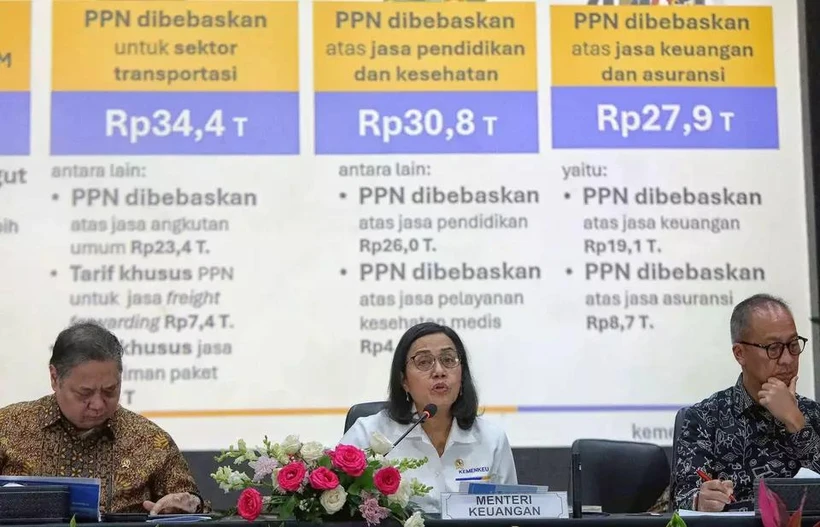The Indonesian government has unveiled a series of economic stimulus packages totaling 827 trillion Rp (51.65 billion USD) for 2025, designed to mitigate economic shocks and address the weakening purchasing power of low- and middle-income groups.
 |
| Minister of Finance Sri Mulyani (center) delivers a statement during a press conference at the Coordinating Ministry for Economic Affairs, Jakarta (Photo: jakartaglobe.id) |
The Indonesian government has unveiled a series of economic stimulus packages totaling 827 trillion Rp (51.65 billion USD) for 2025, designed to mitigate economic shocks and address the weakening purchasing power of low- and middle-income groups.
The stimulus also aims to cushion the impact of an upcoming increase in the value-added tax (VAT) rate from 11% to 12%, set to take effect on January 1, 2025.
Minister of Finance Sri Mulyani Indrawati said the stimulus measures are carefully designed to provide balanced support, particularly for lower-income segments of society, to ensure their financial stability despite the VAT increase.
A significant portion of the stimulus, amounting to 265.6 trillion Rp, will go toward VAT incentives that benefit a range of sectors. These include micro-, small-, and medium-sized enterprises (MSMEs), essential food staples, education, healthcare, transport, energy, low-cost housing, and financial services. Basic necessities like rice, meat, fish, eggs, vegetables, and milk will remain exempt from the VAT.
The government and the House of Representatives have decided not to impose VAT on essential commodities needed by the public, she said, adding some 394 trillion Rp has been allocated for energy subsidies and compensation, which will cover the costs of subsidised fuel, electricity, and LPG.
To further support the economy, the government is allocating 129 trillion Rp to social aid programmes, including food aid, subsidies for health insurance premiums, and easier access to unemployment benefits for laid-off workers.
In the automotive sector, the government will offer tax incentives for electric and hybrid vehicles. Electric vehicles and hybrid cars will receive substantial tax breaks, including a 3% reduction in luxury taxes for hybrid vehicles.
For labor-intensive industries, the government will provide tax exemptions, financing support, and 50% subsidies for workplace accident insurance to encourage job creation and economic growth in this sector.
In the housing sector, the government would extend VAT exemptions for house purchases. The sector not only meets the public’s basic needs but also has a significant multiplier effect, creating jobs and stimulating economic growth, the minister said.
VNA








Thông tin bạn đọc
Đóng Lưu thông tin